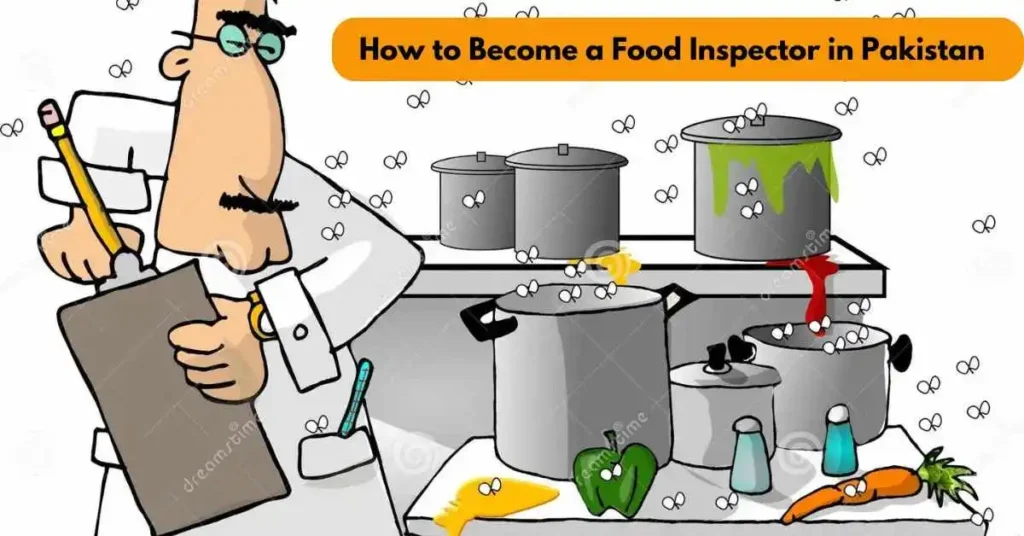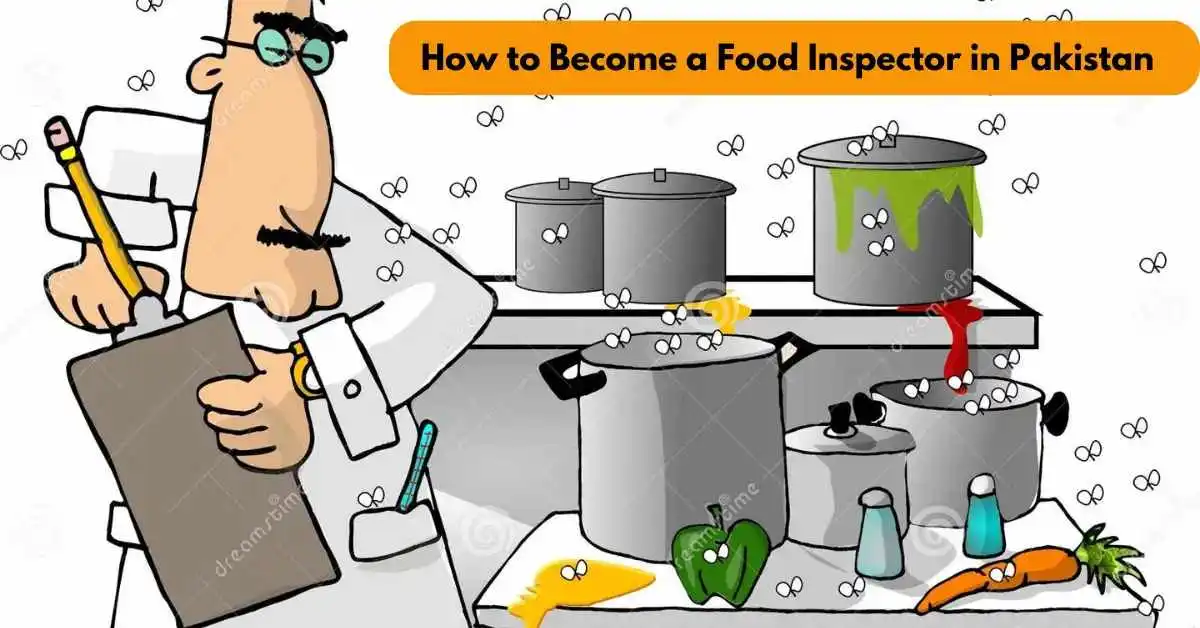Welcome to the comprehensive guide on becoming a Food Inspector in Pakistan. Ever wondered about the critical role of a Food Inspector? This article delves into the essential steps, qualifications, and skills required to pursue this career.

From job descriptions to eligibility criteria, join us as we uncover the pathway to this vital role in ensuring food safety and quality assurance.
What Does a Food Inspector Do?
Food Inspectors play a pivotal role in safeguarding public health by ensuring that the food available in the market is safe for consumption.
They inspect various food establishments, including restaurants, processing plants, and distribution centers, to ensure compliance with health and safety standards.
Their responsibilities involve examining food samples, checking for proper storage, hygiene, and labeling practices, and taking corrective actions when necessary to prevent potential health risks.
Who is a Food Inspector?
A Food Inspector is a professional responsible for monitoring and enforcing food safety regulations and standards set by government agencies. They work diligently to prevent foodborne illnesses and maintain the quality and integrity of the food supply chain.
Becoming a Food Inspector: The Pathway
In Pakistan, the journey to becoming a Food Inspector involves specific steps, educational qualifications, and practical experiences. Let’s delve into the pathway that aspiring individuals can take to pursue this career.
Understanding the Role and Eligibility
To embark on this career path, it’s crucial to comprehend the responsibilities and eligibility criteria for becoming a Food Inspector. This typically includes having a passion for ensuring food safety, being detail-oriented, and meeting specific educational qualifications set by regulatory bodies.
Educational Qualifications Needed
Aspiring Food Inspectors in Pakistan often begin their journey by completing their higher secondary education. Following this, pursuing a bachelor’s degree in a related field, such as food science, nutrition, or food technology, is advantageous.
These educational foundations provide the necessary knowledge and understanding of food safety regulations and inspection processes.
Get more information: Scope of Food Science and Technology in Pakistan: A Bright Future
Steps to Becoming a Food Inspector in Pakistan
- Complete Higher Secondary Education: This forms the initial step. A strong educational foundation at this level is essential.
- Prepare and Clear Entrance Examination: Aspirants typically need to clear specific entrance exams conducted by relevant authorities or institutions offering Food Inspector courses.
- Obtain a Bachelor’s Degree: Pursuing a bachelor’s degree in a related field is a crucial step to gaining in-depth knowledge of food safety and related regulations.
- Pass the Food Inspector Exam: After completing the necessary educational requirements, aspiring individuals must pass the official Food Inspector exam.
- Clear the Interview: Candidates who pass the exam usually face an interview as part of the selection process.
- Consider Pursuing a Master’s Degree: While not always mandatory, obtaining a master’s degree can enhance one’s expertise and job prospects.
- Gain Relevant Work Experience: Practical experience, such as internships or entry-level positions in the food industry or relevant government agencies, can significantly boost one’s candidacy.
Following these steps provides a structured pathway towards becoming a Food Inspector in Pakistan, setting the stage for individuals to contribute effectively to ensuring food safety and quality in the country.
Qualifications and Eligibility Criteria
To become a Food Inspector in Pakistan, specific qualifications and eligibility criteria must be met. Understanding these criteria is crucial for individuals aspiring to pursue this career path.
Educational Criteria for Food Inspectors
The educational requirements typically involve completing higher secondary education and obtaining a bachelor’s degree in fields related to food science, food technology, nutrition, or a similar discipline.
These educational backgrounds equip individuals with the necessary knowledge about food safety standards, food production processes, and regulatory compliance.
Qualifications to Appear for the Food Inspector Exam
Aspiring Food Inspectors usually need to fulfill certain criteria to qualify for the Food Inspector exam. These criteria might include having the required educational qualifications, meeting age criteria, and being a citizen of Pakistan. Specific details regarding eligibility criteria for the exam are usually outlined by the relevant authorities conducting the examination.
Entrance Exam Details
The entrance examination for becoming a Food Inspector evaluates candidates on various aspects related to food safety, food hygiene, inspection procedures, and relevant regulations. It typically tests their knowledge in these areas to ensure they are well-prepared and capable of fulfilling the responsibilities of a Food Inspector.
Skills and Requirements
Becoming a successful Food Inspector involves more than just educational qualifications. It requires a specific set of skills and attributes that are essential for effectively carrying out the responsibilities of this role.
Essential Skills for Food Inspectors
- Soft Skills: Communication skills are crucial for interacting with food industry professionals and effectively conveying inspection findings. Attention to detail is vital when analyzing food samples and identifying potential risks. Additionally, strong problem-solving abilities aid in addressing compliance issues efficiently.
- Physical Fitness: Food inspection often involves physical tasks, such as lifting items or conducting on-site inspections. Good physical health and stamina are important for performing these duties effectively.
- Technical and Hard Skills: Familiarity with food safety regulations, understanding of microbiology, and knowledge of food production processes are necessary technical skills. Proficiency in using relevant inspection tools and equipment is also essential.
Educational, Training, and Certification Requirements
Aside from formal education, specialized training programs and certifications in food safety and inspection can enhance one’s candidacy. These programs provide hands-on training, ensuring familiarity with inspection techniques, regulations, and industry standards.
Continual Learning and Adaptability
Staying updated with the latest advancements in food safety regulations and technologies is crucial for a Food Inspector. Adaptability to evolving standards and techniques is vital in ensuring effective inspections and maintaining food safety.
Developing and honing these skills, along with meeting the educational and training requirements, are integral for individuals aspiring to excel in the role of a Food Inspector in Pakistan.
Food Inspector Jobs, Outlook and Advancement
Understanding the job prospects and opportunities for growth in the field of Food Inspection in Pakistan is essential for aspiring professionals. Let’s explore the potential scenarios and advancement avenues within this career path.
Job Prospects for Food Inspectors
The demand for qualified Food Inspectors remains steady due to the critical role they play in ensuring food safety.
Various sectors, including government agencies, food production companies, and regulatory bodies, actively seek skilled individuals to maintain and enforce food safety standards.
As the public becomes increasingly aware of food safety issues, the need for qualified inspectors continues to grow.
Work Environment Insights
Food Inspectors typically work in both indoor and outdoor settings, conducting inspections at various food establishments. These environments can vary from processing plants and restaurants to distribution centers.
The job might involve travel and working in diverse conditions, necessitating adaptability and flexibility.
Advancement Opportunities
Advancement in this field often comes with experience and further education. With years of experience and a strong track record, Food Inspectors can progress to supervisory or managerial positions within regulatory agencies or move into specialized areas, such as food safety consulting or academia.
How to Apply for Food Inspector Job in Pakistan?
To apply for a Food Inspector job in Pakistan, you need to monitor government job portals and announcements, especially from the Public Service Commission. Make sure to meet the eligibility criteria, including educational qualifications, and apply online through the relevant portal.
Prepare required documents, and be ready for tests or interviews as part of the recruitment process. Keep checking for job updates on official websites like the Federal Public Service Commission (FPSC).
What is Food Inspector Salary and Remuneration in Pakistan
Understanding the financial aspects of a career as a Food Inspector in Pakistan is essential for individuals considering this profession. Let’s explore the salary details and remuneration typically associated with this role.
Average Salary for Food Inspectors
In Pakistan, the salary of a Food Inspector can vary based on several factors, including experience, location, and the sector of employment.
On average, entry-level Food Inspectors can expect a starting salary that ranges from 50000 to 250000. With experience and expertise, salaries can increase, reaching [upper range] for more seasoned professionals or those in supervisory positions.
Factors Influencing Salaries
Several factors contribute to variations in salaries for Food Inspectors. Government agencies might offer standardized pay scales, while private-sector employment could provide competitive salaries based on the company’s policies.
Additional certifications, higher education qualifications, and specialized training might also positively impact earning potential.
Benefits and Perks
Apart from the base salary, Food Inspectors often receive additional benefits such as health insurance, retirement plans, paid leave, and allowances for work-related expenses. Government-employed Food Inspectors might also enjoy other perks, including job security and pension plans.
Conclusion:
The path to becoming a Food Inspector in Pakistan involves a blend of education, specific qualifications, and a distinct skill set dedicated to upholding food safety standards. This guide has highlighted the essential steps, qualifications, skills, job prospects, and financial aspects associated with this career.
Aspiring individuals equipped with the right education, skills, and commitment can play a pivotal role in safeguarding public health by ensuring the quality and safety of the food supply chain.
Embracing this profession means contributing significantly to a healthier, safer society by ensuring that food consumed by the public meets stringent safety and quality standards.

